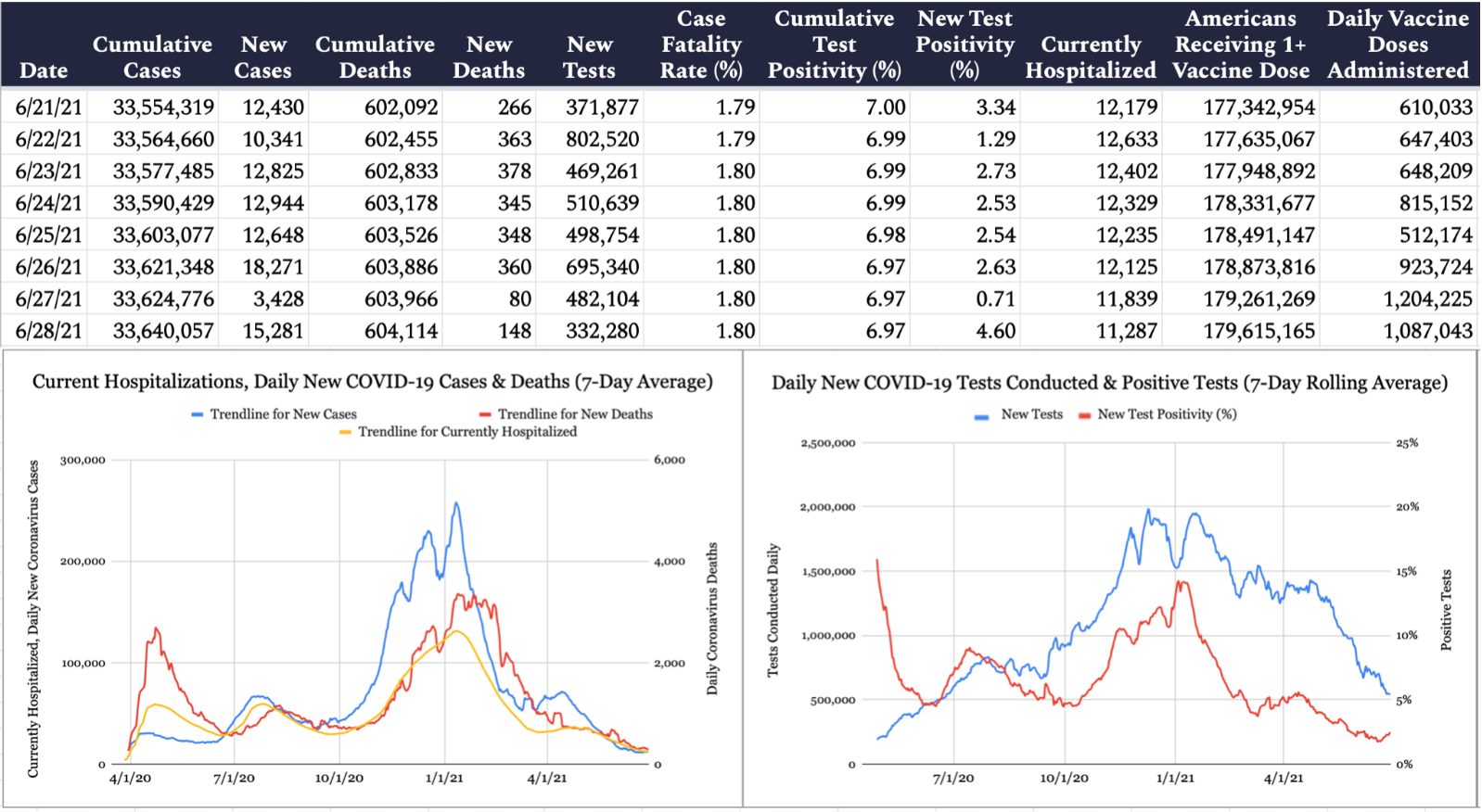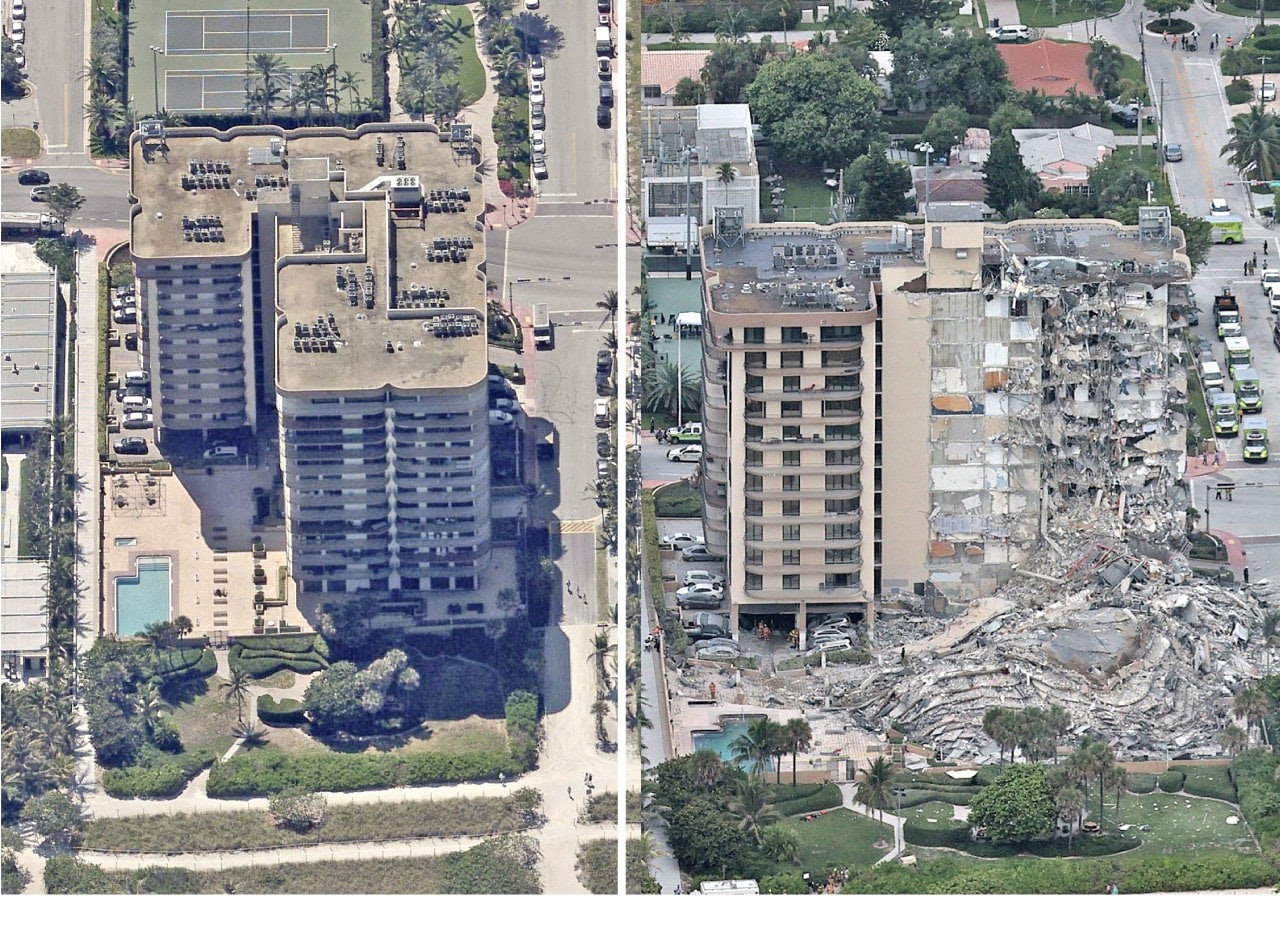Happy Tuesday! Let’s get right to it.
Quick Hits: Today’s Top Stories
-
The Supreme Court on Monday declined to hear a transgender bathroom case, leaving in place lower court decisions allowing transgender students to access public restrooms that do not match the sex on their birth certificates. The court also declined to consider both a case regarding whether states can tax out-of-state teleworkers who work for in-state companies, and a case about the tax treatment of legal marijuana dispensaries.
-
A federal judge on Monday dismissed an antitrust lawsuit brought against Facebook by the Federal Trade Commission, arguing it was “legally insufficient” and did not “plausibly establish” that Facebook “has monopoly power in the market for Personal Social Networking Services.” The judge also rejected a second suit brought by 46 state attorneys general, making similar claims. While the judge dismissed the complaints from the states altogether, the FTC now has 30 days to amend their suit and try again.
-
After nearly eight months of fighting in the country’s Tigray region, the Ethiopian government declared a unilateral cease-fire on Monday. The move came just hours after Tigrayan Defense Forces recaptured control of the regional capital of Mekelle, forcing Ethiopian forces to retreat.
-
E-cigarette company Juul agreed to settle a lawsuit with the state of North Carolina on Monday for $40 million. North Carolina Attorney General Josh Stein had sued the company in 2019 for allegedly “designing, marketing, and selling its e-cigarettes to attract young people” and “misrepresenting the potency and danger of nicotine in its products.” Thirteen other states and the District of Columbia have filed similar lawsuits.
-
The official death toll in the Surfside, Florida, condominium collapse had risen to 11 as of Monday evening, and approximately 150 people remain unaccounted for as the rescue mission continues into its fifth day.
-
Groundbreaking new research suggests that Pfizer and Moderna’s mRNA COVID-19 vaccines produce immunity that could last for years, if not a lifetime. The “germinal centers” in participants’ lymph nodes were still highly active 15 weeks after the first dose—a very good sign.
-
The United States confirmed 15,281 new cases of COVID-19 yesterday per the Johns Hopkins University COVID-19 Dashboard, with 4.6 percent of the 332,280 tests reported coming back positive. An additional 148 deaths were attributed to the virus on Monday, bringing the pandemic’s American death toll to 604,114. According to the Centers for Disease Control, 11,287 Americans are currently hospitalized with COVID-19. Meanwhile, 1,087,043 COVID-19 vaccine doses were administered yesterday, with 179,615,165 Americans having now received at least one dose.

Biden Airstrikes: Overstep or Overdue?
After months of escalating drone attacks aimed at U.S. and coalition forces, President Joe Biden hit back Sunday with a series of precision airstrikes on Iran-backed militia strongholds in the Middle East. The retaliatory offensives targeted and successfully struck two operational and weapons storage facilities in Syria and one in Iraq, all used by terror groups such as Kata’ib Hezbollah and Kata’ib Sayyid al-Shuhada to funnel armaments and explosives from Tehran into countries across the region.
According to the U.K.-based Syrian Observatory for Human Rights, at least seven fighters were killed in the blasts. SANA—a Syrian state-run news agency—reported that one child was among the casualties.
Citing the militias’ plans to launch additional unmanned aerial vehicle (UAV) assaults on U.S. personnel, Pentagon press secretary John Kirby said Sunday that “the United States took necessary, appropriate, and deliberate action designed to limit the risk of escalation—but also to send a clear and unambiguous deterrent message.”
“As a matter of international law, the United States acted pursuant to its right of self-defense. The strikes were both necessary to address the threat and appropriately limited in scope,” Kirby added. “As a matter of domestic law, the President took this action pursuant to his Article II authority to protect U.S. personnel in Iraq.”
But these assertions are now in question, as regional analysts debate the decision’s efficacy and American lawmakers call into question its legality.
On the latter, Sen. Chris Murphy—a Democrat on the Senate Foreign Relations Committee (FRC)—has been particularly vocal. “My concern is that the pace of activity directed at U.S. forces and the repeated retaliatory strikes against Iranian proxy forces are starting to look like what would qualify as a pattern of hostilities under the War Powers Act,” Murphy said Sunday. “Both the Constitution and the War Powers Act require the president to come to Congress for a war declaration under these circumstances.”
The strikes are now being used as a launching point to debate the future of the Authorization for the Use of Military Force (AUMF) in Iraq, which the House voted 268-161 to repeal earlier this month.
“I will be seeking more information from the Administration in the coming days regarding what specifically predicated these strikes, any imminent threats they believed they were acting against, and more details on the legal authority the Administration relied upon,” Sen. Bob Menendez, chair of the FRC, said Monday. “Congress has the power to authorize the use of military force and declarations of war, and the Senate Foreign Relations Committee is planning to hear from the Administration more on these strikes as well as have a broader discussion on the 2002 AUMF when we return to Washington, D.C.”
The committee is expected to weigh in on a measure to reverse the law—which grants the executive branch expansive warmaking powers in the region absent congressional approval—in mid-July.
House Speaker Nancy Pelosi, meanwhile, praised the strikes as a “targeted and proportional response to a serious and specific threat.”
But to some experts, this strategy misses the mark. “No conflict has ever been won with proportionality,” Michael Rubin, a former Pentagon official and resident scholar at the American Enterprise Institute, told The Dispatch. “If you want an enemy or an adversary to stand down, you need to act without proportionality to convince them that the price of their provocations aren’t worth it.”
Jason Brodsky, a senior Middle East analyst and editor at Iran International, concurred. “This has been a long overdue measure, in my opinion. There have been multiple very sophisticated strikes using drones on U.S. and coalition forces in Iraq,” Brodsky said. “Before the strikes [Sunday night], there had been no retaliation and the drone attacks just kept coming and increasing in frequency.”
The Biden administration ordered retaliatory hits on Iran-backed militia positions once before in February, when it deployed F-15Es to carry out airstrikes that killed at least 20 fighters in Syria. This latest move, though it resulted in fewer confirmed casualties, is broader in scope because of its targets within Iraq. The U.S.—which is in the country “at the invitation of the Government of Iraq for the sole purpose of assisting the Iraqi Security Forces in their efforts to defeat ISIS,” Kirby said—typically avoids striking Iran-backed targets in Iraq in deference to the Iraqi government.
A spokesman for Iraqi Prime Minister Mustafa al-Kadhimi, a reliably U.S.-friendly leader, yesterday expressed his “strong denunciation and condemnation of the American bombing that targeted a site on our border with Syria, stressing that this attack represents a flagrant violation of Iraqi sovereignty, rejected by all international laws and covenants.”
This statement, the first of its kind from an Iraqi official, signals a shift toward Iran in the ongoing regional power struggle between Tehran and Washington. “Iraq, as you’ve seen with some of the reactions from Baghdad, is caught between an Iranian rock and an American hard place,” Brodsky said.
Several developments preceding the Pentagon’s strikes also indicate a deterioration in the U.S.-Iraq relationship in favor of Iran. On Saturday, al-Kadhimi presided over a parade showcasing the Popular Mobilization Forces (PMF)—a catch-all descriptor of Iran-backed forces ostensibly formed to fight the Islamic State that often target U.S. and coalition forces—in a break from his usual wariness toward the militias. And the Tehran Times—an Iranian regime-friendly publication—reported that al-Kadhimi publicly touted “very good relations” with Iranian President-elect Ebrahim Raisi Thursday.
According to Rubin, who expounds on these topics in a recent story for 19FortyFive, the Iraqi shift to Tehran is in part attributable to the apparent U.S. retreat from the region, and in part due to intensifying hostilities from Iran and Iran-supported groups.
“There’s a widespread belief in Iraq—not only shared on the streets of Iraq but also among its top officials—that the Iranians are going to get much more aggressive between now and when the [Iraqi] elections occur in October,” Rubin said. “The reason they’re going to get much more aggressive is that the Iranians don’t believe that the Americans will respond to their aggression.”
“Biden may want to compartmentalize Iraq,” he added, “but the entire world is looking at the United States’ withdrawal from Afghanistan and drawing conclusions from that.”
Catastrophe in Surfside
It took about 30 seconds for a beachfront section of Champlain Towers South—a 12-story condo building in Surfside, Florida—to collapse in the wee hours of last Thursday morning. Eleven people were confirmed dead as of Monday night, but that tally is likely to rise sharply in the coming days, as approximately 150 of the tower’s residents are still unaccounted for. Search-and-rescue operations remain ongoing, five days after the collapse.

“It was like a mini 9/11,” Nicholas Balboa, who was visiting family in Surfside when the building collapse began, told the Washington Post. “I mean, absolutely it looked like the World Trade Center, just debris everywhere. Except this was at home—there were beds you could see sticking out of the rubble.”
The cause of the collapse is yet to be determined, and may never be known with absolute certainty. Officials in Surfside and Miami-Dade County recently hired Allyn Kilsheimer—a world-renowned engineer and consultant who examined the Pentagon following the 9/11 attacks—to conduct a building autopsy. Kilsheimer said over the weekend that “probably 90 percent of the collapses we’ve dealt with—other than things caused by bombs and planes—have been multiple things all going wrong at the same time.”
For the families of those killed or missing, it is of paramount importance whether building or city officials were aware of information that might have helped prevent the catastrophe had it been acted on sooner.
NPR first reported minutes from a November 2018 meeting in which a Surfside inspector told the Champlain Tower South Condominium Association the building was “in very good condition.” But five weeks before that, an engineering report sent to building officials indicated that the building needed more than $9 million in structural repairs. $3.8 million was allocated by the consultants for garage and pool deck remediation—the alleged location of the first indications of collapse. However, the report did not warn of a collapse risk.
The minutes note that Ross Pierto, a former building official for Surfside, reviewed the report. The report was forwarded to Pierto from Mara Chouela, a condo board member. “I don’t know anything about it,” Pierto told reporters for the Miami Herald.
In Miami-Dade, non-single-family structures are required to be recertified by the county as safe after 40 years of use. The report was commissioned in anticipation of this 40-Year Recertification, which came due in 2021 (the complex was built in 1981). The building’s recertification had not been completed at the time of the collapse.
Frank Morabito of Morabito Consultants, the firm that conducted the report, wrote that some of the waterproofing below the pool deck had failed, which allowed water damage to occur in concrete slabs under the pool deck and parking garage. The 2018 report alleged “major structural damage,” continuing, “failure to replace the waterproofing in the near future will cause the extent of the concrete deterioration to expand exponentially.”
Asked about the engineering report, which some have alleged is a smoking gun indicating negligence on behalf of the city or condominium board, Kilsheimer told reporters: “Nothing in it raised a red flag.”
One of the Champlain Towers owner’s association lawyers, Donna DiMaggio, told the New York Times that her clients sought a deliberate approach to the necessary repairs, believing they had time to do it well.
The building autopsy is not currently the top priority, however. Kilsheimer’s team is working on computer models and analyzing other buildings on the site, including a walkthrough of the Champlain Towers North and East buildings, but must wait for the rescue teams to complete their mission before they can begin work onsite.
Those unaccounted for are presumed to be buried under literal tons of wreckage, but rescuers maintain hope that some may still be found alive. Miami-Dade County Mayor Daniella Levine Cava confirmed that the “search and rescue operation continues,” at a press conference on Monday.
Worth Your Time
-
The internet is chock-full of infrastructure opinions these days, but Yuval Levin’s analysis for National Review stands out as particularly insightful. Levin—who worked on policy in the George W. Bush administration—writes that “a lot of the stories about this process want to describe two clear sides, and so they’re trying to figure out if Senate Republicans are serious about offers they make, and whether Democrats, led by the president, are going to let this process drag out or just stop pretending it’s possible to work with Republicans. That framework misses almost everything that’s interesting about this story.”
-
The challenges of World War II spurred a golden age of innovation. In his latest article for The Atlantic, Derek Thompson argues that the COVID-19 pandemic could do the same thing today—if we make some strategic adjustments. “Why was our response to COVID-19 so different from our response to World War II? One simple answer is: focus,” he writes. “During the war, people within the U.S. government broadly agreed that the Nazis existed; that they posed a real threat; and that Americans could trust military leadership to articulate useful goals for beating the enemy. As a result, clear lines of communication developed among the military, OSRD, and the White House. So when the military said it needed better navigating technology, OSRD delivered huge breakthroughs in sonar and radar.” During the pandemic, however, “the most important breakthroughs came from the bottom up: Thousands of scientists clamored to understand the nature of the virus; hundreds of hospital networks gradually learned how to help severely ill patients; a ragtag team built the COVID Tracking Project; and a start-up Fast Grants program accelerated the funding of overlooked projects.”
Presented Without Comment
Toeing the Company Line
-
Sarah and David broke down the Supreme Court’s refusal to hear some contentious cases involving interstate conflict, transgender bathroom access, and marijuana on Monday’s Advisory Opinions. Plus, a Supreme Court opinion on cases involving police officers’ use of force, a property law dispute, and a heated confrontation at the 5th Circuit.
-
On the site today: a piece by Tripp Grebe explaining the laws governing conservatorships like the one Britney Spears is currently trying to escape, and Abby McCloskey on universal pre-k and alternative programs to serve underprivileged young children.
Let Us Know
In light of that Derek Thompson piece on post-pandemic innovation, are there some inventions or societal practices that sprang up in response to COVID-19 that you hope stick around for the long haul?
Reporting by Declan Garvey (@declanpgarvey), Andrew Egger (@EggerDC), Charlotte Lawson (@charlotteUVA), Ryan Brown (@RyanP_Brown), Harvest Prude (@HarvestPrude), Tripp Grebe (@tripper_grebe), Emma Rogers (@emw_96), Price St. Clair (@PriceStClair1), Jonathan Chew (@JonathanChew19), and Steve Hayes (@stephenfhayes).






Please note that we at The Dispatch hold ourselves, our work, and our commenters to a higher standard than other places on the internet. We welcome comments that foster genuine debate or discussion—including comments critical of us or our work—but responses that include ad hominem attacks on fellow Dispatch members or are intended to stoke fear and anger may be moderated.
You are currently using a limited time guest pass and do not have access to commenting. Consider subscribing to join the conversation.
With your membership, you only have the ability to comment on The Morning Dispatch articles. Consider upgrading to join the conversation everywhere.